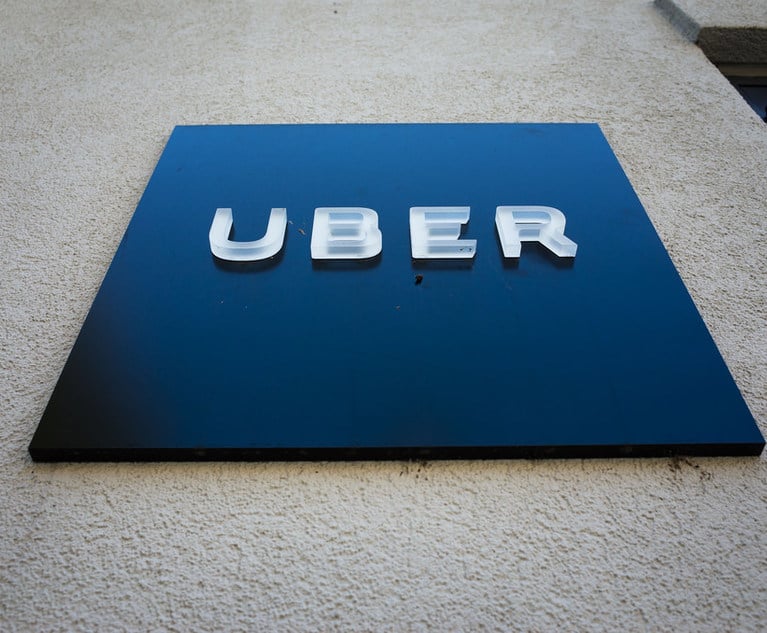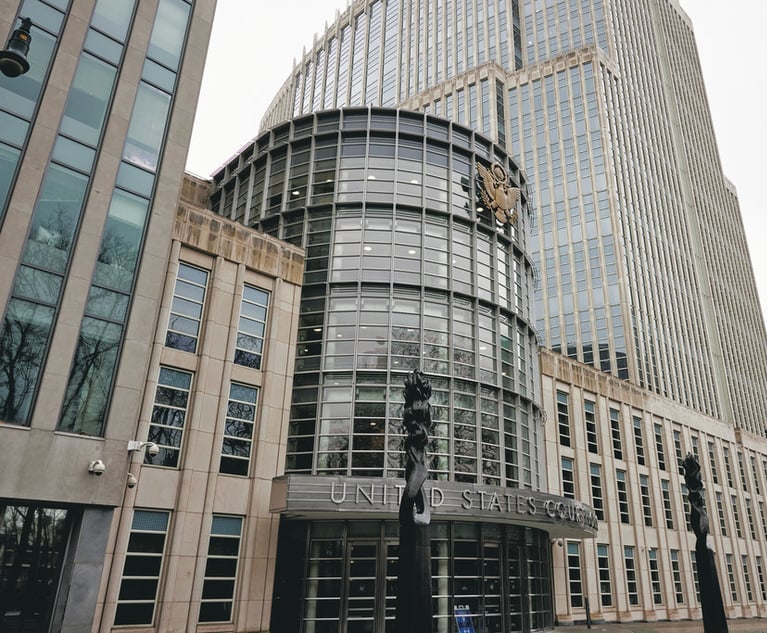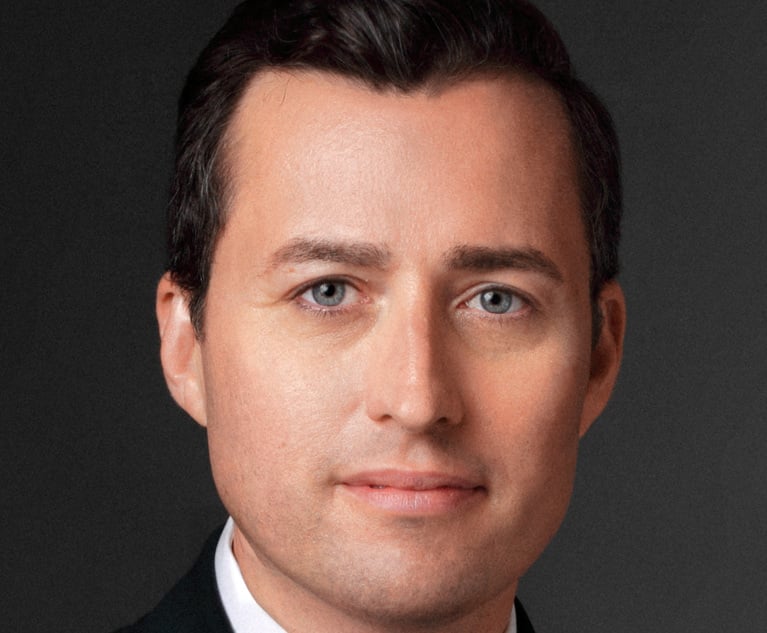Time for Insurers To Face the Consequences of Consequential Damages
The First Department issued a clear decision that policyholders may recover the consequential damages, including attorney fees, caused by the bad-faith dilatory practices all too often employed by insurance companies.
October 11, 2019 at 02:30 PM
7 minute read
 In early 2019, the First Department provided policyholders an arrow in the quiver for their oft-repeated battle to securing coverage from intransigent insurance companies. In D.K. Property v. National Union Fire Insurance Company of Pittsburgh, Pa., 168 A.D.3d 505 (1st Dept. 2019), the First Department issued a clear decision that policyholders may recover the consequential damages, including attorney fees, caused by the bad-faith dilatory practices all too often employed by insurance companies. In so doing, the First Department offered New York policyholders a roadmap for pleading such damages.
In early 2019, the First Department provided policyholders an arrow in the quiver for their oft-repeated battle to securing coverage from intransigent insurance companies. In D.K. Property v. National Union Fire Insurance Company of Pittsburgh, Pa., 168 A.D.3d 505 (1st Dept. 2019), the First Department issued a clear decision that policyholders may recover the consequential damages, including attorney fees, caused by the bad-faith dilatory practices all too often employed by insurance companies. In so doing, the First Department offered New York policyholders a roadmap for pleading such damages.
Court of Appeals Expressly Permitted Recovery of Consequential Damages in Insurance Actions. For over a decade, New York law recognized that aggrieved policyholders injured at the hands of their unscrupulous insurance company could pursue claims for consequential damages that were reasonably contemplated by the parties at the time of contracting. In the companion cases of Bi-Economy Market v. Harleysville Insurance, 10 N.Y.3d 187 (2008) and Panasia Estates v. Hudson Insurance, 10 N.Y.3d 200 (2008), the Court of Appeals expressly condoned the recovery of consequential damages in such situations.
The facts in Panasia likely sound familiar to many policyholders. The policyholder in Panasia owned a rental property in Manhattan, which Hudson Insurance insured. 10 N.Y.3d at 202. After damage to the property, the policyholder timely notified Hudson of the loss but, according to the policyholder, "Hudson failed to investigate or adjust the claim until several weeks later. Hudson then denied the claim three months after that … ." Id. The policyholder then commenced the coverage action seeking "both direct and consequential damages that it claimed stemmed from Hudson's breach." Id. The IAS Court in Panasia denied Hudson's motion to limit the damages, and the Appellate Division affirmed. The Court of Appeals also affirmed, holding that the "courts below properly rejected Hudson's contention that it was entitled to judgment as a matter of law because consequential damages are not recoverable in a claim for breach of an insurance contract." Id. at 203. As the Court of Appeals stated, "consequential damages resulting from a breach of the covenant of good faith and fair dealing may be asserted in an insurance contract context, so long as the damages were 'within the contemplation of the parties as the probable result of a breach at the time of or prior to contracting.'" Id. (citation omitted).
The First Department Rejected the Typical Ways Insurance Companies Looked To Avoid Claims for Consequential Damages. Since then, however, insurance companies have sought to chip away at Court of Appeals' pronouncement and avoid even having to defend bad-faith claims. In particular, insurance companies often have advanced two separate arguments as to why a policyholder should not be permitted to proceed with claims for consequential damages. The First Department soundly rejected both arguments.
First, insurance companies often argued that the policyholder's claim for consequential damages must be dismissed for want of allegations showing specific facts that the particular consequential damages were within the reasonable contemplations of the parties. See, e.g., Ripka v. Safeco Ins., No. 5:14-CV-1442, 2015 WL 3397961, at *6 (N.D.N.Y. May 26, 2015) ("Ripka has not pleaded specific facts capable of showing that consequential damages, beyond the limits of the Homeowner's Policy, were reasonably contemplated by the parties, or that they considered, at the time of contracting, that consequential damages would be available in the event of a delay in payment or other breach of the policy."). Indeed, this is what the IAS Court held in D.K. Property. See D.K. Property v. Nat'l Union Fire Ins. Co. of Pittsburgh, PA, 59 Misc.3d 714, 720 (Sup. Ct. N.Y. County 2018) (D.K. Property I). Insurance companies latched on to the Court of Appeals' statement in Bi-Economy, 10 N.Y.3d at 192, that "[s]pecial, or consequential damages … are also recoverable in limited circumstances," to argue that special damages require specific, stringent pleading requirements. The Appellate Division in D.K. Property made clear that there is no special pleading requirement regarding the specificity required to plead a claim of consequential damages.
Specifically, the First Department explained that "[a]lthough proof of such consequential damages will ultimately rest on what liability the insurer is found to have 'assumed consciously,' or from the plaintiff's point of view, have warranted the plaintiff to reasonably suppose the insurer assumed when the insurance contract was made, a determination of whether such damages were, in fact, foreseeable should not be decided on a motion to dismiss and must await a fully developed record." D.K. Property, 168 A.D.3d at 506-07. The Appellate Division further stated, in response to the typical insurance company argument, that "there is no heightened pleading standard requiring plaintiff to explain or describe how and why the 'specific' categories of consequential damages alleged were reasonable and foreseeable at the time of contract." Id. at 507.
The First Department's holding that there is no heightened pleading standard means that claims for consequential damages arising out of improper claims handling practices will not be prematurely dismissed if the policyholder can reasonably allege that such damages were foreseeable at the time they purchased the policy. The opportunity to develop evidence to support a consequential damages claim will undoubtedly impact insurance coverage cases in New York.
Second, insurance companies also seek immediate dismissal of bad faith consequential damages claims on the grounds that they are duplicative of a breach of contract claim. See, e.g., Orient Overseas Assocs. v. Xl Ins. Am., 132 A.D.3d 574, 577 (1st Dept. 2015) (stating "there is no compelling authority indicating that a separate, non-contractual claim exists for 'bad faith claims handling'"). The First Department made clear, however, that a bad faith claim may go forward where the allegations of bad faith were separate from the standard breach of contract claim.
Specifically, the First Department noted that "a claim for breach of contract and one for bad faith handling of an insurance claim are not necessarily duplicative," and that D.K. Property's "first and second causes of action plead different conduct by defendant," which permitted it to proceed with a bad-faith cause of action. See D.K. Property, 168 A.D.3d at 507. To get around the typical "duplicative" argument, the policyholder in D.K. Property made clear that the insurance company's unreasonable claims handling and damages went beyond the simple breach of contract and failure to pay the loss. Rather, the policyholder alleged that the insurer undertook unreasonable claims handling in bad faith, for the purpose of making the claim too expensive for plaintiff to pursue and inducing plaintiff to abandon its claim for coverage. See D.K. Property I, 59 Misc.3d at 717 (quoting Am. Cmplt. ¶ 19). These allegations included, among other things, that the insurance company's engineer "expressed agreement that the negligent renovation design and construction" of the neighboring building was the source of distress to plaintiff's building, but National Union "abandoned" the policyholder, forcing it to sue the tortfeasors in a separate action in this court. Id. (quoting Am. Cmplt. at ¶¶ 20, 31). In addition, the policyholder claimed that the insurance company's delay and unreasonable demands for information and inspections of the premises had caused plaintiff to incur certain other expenses. Id. The policyholder also specified the damages, including attorneys' fees, suffered by D.K. Property as a result of National Union's bad faith. Id. The teaching of D.K. Property is that a well-pled complaint alleging a separate claim for bad faith can proceed in New York.
At bottom, New York policyholders should consider the potential recovery of consequential damages as a result of D.K. Property; as the First Department has made clear, insurance companies may not easily escape litigation over the damages caused by improper claims handling.
Andrew Bourne and Joshua Blosveren are partners at Hoguet Newman Regal & Kenney. They represented D.K. Property in the matter discussed herein. They can be reached at [email protected] and [email protected], respectively.
This content has been archived. It is available through our partners, LexisNexis® and Bloomberg Law.
To view this content, please continue to their sites.
Not a Lexis Subscriber?
Subscribe Now
Not a Bloomberg Law Subscriber?
Subscribe Now
NOT FOR REPRINT
© 2025 ALM Global, LLC, All Rights Reserved. Request academic re-use from www.copyright.com. All other uses, submit a request to [email protected]. For more information visit Asset & Logo Licensing.
You Might Like
View All
Uber Files RICO Suit Against Plaintiff-Side Firms Alleging Fraudulent Injury Claims
3 minute read
Insurance Company Sues Over 180 Health Care Providers for Fraud Under RICO
3 minute read
New York Court of Appeals Tightens Pleading Standards Against Insurance Policyholder
7 minute read
Amid Growing Litigation Volume, Don't Expect UnitedHealthcare to Change Its Stripes After CEO's Killing
6 minute readTrending Stories
- 1States Accuse Trump of Thwarting Court's Funding Restoration Order
- 2Microsoft Becomes Latest Tech Company to Face Claims of Stealing Marketing Commissions From Influencers
- 3Coral Gables Attorney Busted for Stalking Lawyer
- 4Trump's DOJ Delays Releasing Jan. 6 FBI Agents List Under Consent Order
- 5Securities Report Says That 2024 Settlements Passed a Total of $5.2B
Who Got The Work
J. Brugh Lower of Gibbons has entered an appearance for industrial equipment supplier Devco Corporation in a pending trademark infringement lawsuit. The suit, accusing the defendant of selling knock-off Graco products, was filed Dec. 18 in New Jersey District Court by Rivkin Radler on behalf of Graco Inc. and Graco Minnesota. The case, assigned to U.S. District Judge Zahid N. Quraishi, is 3:24-cv-11294, Graco Inc. et al v. Devco Corporation.
Who Got The Work
Rebecca Maller-Stein and Kent A. Yalowitz of Arnold & Porter Kaye Scholer have entered their appearances for Hanaco Venture Capital and its executives, Lior Prosor and David Frankel, in a pending securities lawsuit. The action, filed on Dec. 24 in New York Southern District Court by Zell, Aron & Co. on behalf of Goldeneye Advisors, accuses the defendants of negligently and fraudulently managing the plaintiff's $1 million investment. The case, assigned to U.S. District Judge Vernon S. Broderick, is 1:24-cv-09918, Goldeneye Advisors, LLC v. Hanaco Venture Capital, Ltd. et al.
Who Got The Work
Attorneys from A&O Shearman has stepped in as defense counsel for Toronto-Dominion Bank and other defendants in a pending securities class action. The suit, filed Dec. 11 in New York Southern District Court by Bleichmar Fonti & Auld, accuses the defendants of concealing the bank's 'pervasive' deficiencies in regards to its compliance with the Bank Secrecy Act and the quality of its anti-money laundering controls. The case, assigned to U.S. District Judge Arun Subramanian, is 1:24-cv-09445, Gonzalez v. The Toronto-Dominion Bank et al.
Who Got The Work
Crown Castle International, a Pennsylvania company providing shared communications infrastructure, has turned to Luke D. Wolf of Gordon Rees Scully Mansukhani to fend off a pending breach-of-contract lawsuit. The court action, filed Nov. 25 in Michigan Eastern District Court by Hooper Hathaway PC on behalf of The Town Residences LLC, accuses Crown Castle of failing to transfer approximately $30,000 in utility payments from T-Mobile in breach of a roof-top lease and assignment agreement. The case, assigned to U.S. District Judge Susan K. Declercq, is 2:24-cv-13131, The Town Residences LLC v. T-Mobile US, Inc. et al.
Who Got The Work
Wilfred P. Coronato and Daniel M. Schwartz of McCarter & English have stepped in as defense counsel to Electrolux Home Products Inc. in a pending product liability lawsuit. The court action, filed Nov. 26 in New York Eastern District Court by Poulos Lopiccolo PC and Nagel Rice LLP on behalf of David Stern, alleges that the defendant's refrigerators’ drawers and shelving repeatedly break and fall apart within months after purchase. The case, assigned to U.S. District Judge Joan M. Azrack, is 2:24-cv-08204, Stern v. Electrolux Home Products, Inc.
Featured Firms
Law Offices of Gary Martin Hays & Associates, P.C.
(470) 294-1674
Law Offices of Mark E. Salomone
(857) 444-6468
Smith & Hassler
(713) 739-1250






